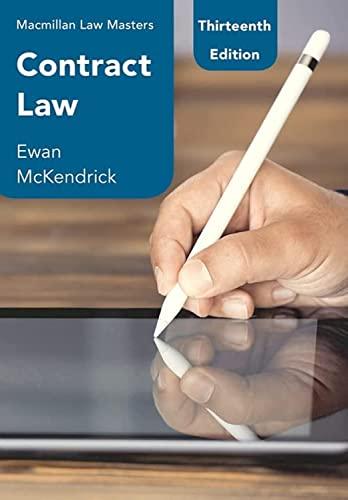Question
1. Thomas is a brand-new car dealer. He has several new Toyota Camry 2.4 cars. He places an advertisement in the Saturday edition of his
1.
Thomas is a brand-new car dealer. He has several new Toyota Camry 2.4 cars. He places an advertisement in the Saturday edition of his local newspaper stating: "New Toyota Camry 2.4: 20,000 cash."
When Ben sees the adverts he immediately posts a letter of acceptance of Thomas's offer. Carol also sees the advert and after inspecting the car, offers Thomas a cheque for 20.000, but he refuses to accept the cheque and tells her she cannot have the car.
Later in the day Dave asks Thomas if he will keep the offer open until he can get to his bank to arrange a loan. Thomas agrees but later in the day when Eric says that he will pay 20.000 in cash for the car he agrees to sell car to Eric.
On Monday morning Ben's letter arrives, and Dave returns to complete his purchase of the car. In the afternoon Eric phones Thomas to say that he has had second thoughts and no longer wishes to buy car.
Required:
Consider the above situation with the respect to the rules governing the elements of contracts under the UK common law:
1. Whether Ben has entered into a binding contract with Thomas.
2. Whether Carol has entered into a binding contract with Thomas.
3. Whether Dave has entered into a binding contract with Thomas.
4. Whether Thomas has any right of action against Eric.
Explain your answer carefully and refer to any relevant cases in your materials.
2.
Hoang Yen had 900 million dong invested in a deposit account and decided to invest this money in company shares and bonds.
She decided to invest 400 million dong in partly-paid shares issued by Company A. The nominal value of these shares was 800 million dong.
A further 200 million dong was invested in shares issued by Company B. This company was experiencing financial difficulties and issued the shares at a discount to their nominal value of 400 million dong.
The remaining 200 million dong was invested in shares issued by Company C. These shares had a total nominal value of 100 million dong.
Hoang Yen also invested 100 million dong in bonds issued by Company C.
Company A and Company B were subsequently liquidated. Disappointed with her investments in these companies, Hoang Yen sought to recover the premium she had paid for the shares in Company C.
Required:
With reference to the Vietnamese enterprise law:
(a) Discuss the consequences for Hoang Yen arising from her investments in shares in Company A and Company B.
(b) Explain whether Hoang Yen can recover the premium she paid for the shares in Company C.
3.
Elements plc is the parent company in a group of companies operating in the production and distribution of water-sports equipment in the United Kingdom.
Elements plc holds the majority of shares in Aqua Ltd, which supplies the watersports equipment to local sellers. The remaining shares are held by two directors of Aqua Ltd, both of whom were appointed by Elements plc.
Swimmers Ltd is one Aqua Ltd's major suppliers and creditors. It has been striving to obtain payment for deliveries supplied to Aqua Ltd. However, it has recently learnt that Aqua Ltd has ceased trading. Moreover, it seems that in the last five months, materials delivered to Aqua Ltd, and orders received by Aqua Ltd, were all passed on to Waterfalls Ltd. Waterfalls Ltd is a wholly-owned subsidiary of Elements plc, and was only recently incorporated.
With reference to the UK common law:
Advise Swimmers Ltd whether it can obtain payment from either Elements plc or Waterfalls Ltd in respect of the debts of Aqua Ltd.)
Step by Step Solution
There are 3 Steps involved in it
Step: 1

Get Instant Access to Expert-Tailored Solutions
See step-by-step solutions with expert insights and AI powered tools for academic success
Step: 2

Step: 3

Ace Your Homework with AI
Get the answers you need in no time with our AI-driven, step-by-step assistance
Get Started


